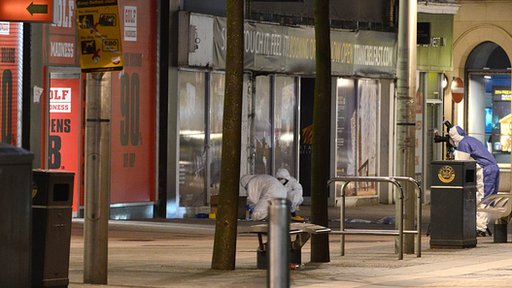Lost in Time? Controversy over Police Powers in Northern Ireland
Image Source: http://www.bbc.co.uk/news/uk-northern-ireland-25412487
– Colin Murray (Senior Lecturer, Newcastle Law School) colin.murray@newcastle.ac.uk
This post was first published on Human Rights in Ireland
The Troubles just won’t slip conveniently into history. In recent weeks anyone confident that Northern Ireland has “moved on” will have received multiple jolts to such complacency. A car bomb (and last night a fire bomb, pictured left) and Loyalist protests have disrupted shopping in Belfast’s city centre in the run up to Christmas. And as for the Troubles themselves, they have been a prominent part of the news headlines. Revelations UK army units operating beyond the standard rules of engagement in the 1970s. Outcry over the fate of the “disappeared” and over the strenuous denials by Gerry Adams over his own involvement. Shock over the detail of collusion between members of the Garda and the Provisional IRA in the findings of the Smithwick Tribunal. The risk of more bloodshed today running hand-in-hand with blood continuing to seep under the door marked “the Troubles” with every new revelation.
This barrage of stories has wrong footed many. Most obviously, Sinn Féin has seriously miscalculated in its response to the Smithwick Report’s findings, the Disappeared documentary and the conviction of Liam Adams. The dogmatic adherence to the line that Provisional IRA volunteers were “only doing their duty” in a dirty war has never washed for the UK Government in accounting for the actions of members of the UK security forces, and indeed, in responses to events such as the Saville Report, has now largely given way to outright apologies rather than attempted justifications.
Perhaps, in this atmosphere, Northern Ireland Attorney-General John Larkin misread the auguries when he put his head above the parapet and raised the possibility of calling a halt to investigations of Troubles-era political violence, finding himself alone in the face of a barrage of criticism. Maybe Larkin thought that a stultified debate over what to do about the past could be advanced by someone saying the unthinkable. At the very least he did prove that there are certain things that can unite politicians from all political perspectives in the Province. Victims must never be forgotten went the rallying cry, all the more galling when the Northern Ireland Executive has steadfastly failed to move any proposals to address victims’ issues since the Assembly was restored in 2007.
Still, the furore is nonetheless surprising. Few commentators can predict with any degree of accuracy what reports or comments will catch the attention of Northern Ireland’s politicians. October saw the Northern Ireland Policing Board published its extensive Thematic Review on the use of police powers to stop and search and stop and question under the Terrorism Act 2000 and the Justice and Security (NI) Act 2007. Maybe the title put people off, for the Review (despite being trailed by David Anderson QC, the UK Independent Reviewer of Counter-Terrorism legislation) generated almost no attention, despite the high levels of public concern over stop and search. Just this May the Northern Ireland Court of Appeal ruled that the stop and search under section 21 of the Justice and Security (NI) Act 2007 of a former IRA hunger striker and a brother-in-law of Martin McGuinness were unlawful (the Fox and McNulty Case). The Court concluded (at [45]):
A power vested in the police to openly stop and question a person is not the exercise of a covert surveillance power but it partakes some of the characteristics of surveillance. The fact that it can lead to open stopping and questioning in circumstances which do not ensure even privacy between the police and the individual adds to the potential for invasions of the article 8 right. It is a power which does require justification and which provides effective guarantees and safeguards against abuse.
As the Thematic Review found, working with both the Fox and McNulty decision and the jurisprudence of the European Court (ECtHR) on the right to privacy (p.27):
The case law of the ECtHR clearly establishes that covert and secret surveillance by state agencies constitutes a particular threat to democracy and freedom which requires strict justification in the interest of national security or for the prevention of crime. The system itself must provide adequate and effective guarantees against abuse.
It ultimately restated the importance of the ECHR in policing and security operations (p.110):
The debate about the police use of powers to stop and search and stop and question can become clouded by many false assumptions, which it is hoped are challenged in this thematic review, but what is abundantly clear is that the Human Rights Act 1998 does not value individual rights at the expense of the community. Rather, it provides a model for a functioning society within which certain rights can be limited while protecting the human rights of all members of society. The Committee has stressed many times, but wishes to restate its central message that there is no conflict between human rights and policing because policing is the protection of human rights.
Such conclusions should resonate not just through Northern Ireland, but into debates over treatment of individuals such as David Miranda as well. So why did the report get ignored? It must have been the title. Or are we, as a community, better disposed to looking back to the time of the Troubles, rather than considering how its legal framework continues to affect our lives?
